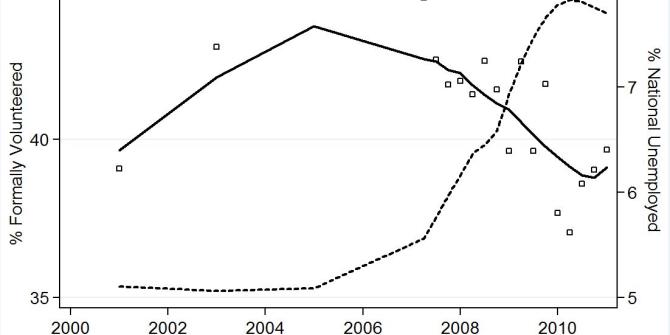 The UK has one of the world’s most open and transparent systems for the government to provide financial information to the public. But with the Comprehensive Spending Review set to propose drastic programme changes and cutbacks, Joachim Wehner finds that compared with other advanced countries there is a serious lack of oversight and scrutiny. The results are that Parliament sees only massively under-detailed spending estimates. Far too rapid decision-making often takes place on major budget issues, such as cutbacks, where consequences are often poorly understood, making consensus hard to achieve.
The UK has one of the world’s most open and transparent systems for the government to provide financial information to the public. But with the Comprehensive Spending Review set to propose drastic programme changes and cutbacks, Joachim Wehner finds that compared with other advanced countries there is a serious lack of oversight and scrutiny. The results are that Parliament sees only massively under-detailed spending estimates. Far too rapid decision-making often takes place on major budget issues, such as cutbacks, where consequences are often poorly understood, making consensus hard to achieve.
The International Budget Partnership launches its 2010 global survey of budget transparency, the Open Budget Index (OBI), on 19 October, one day ahead of the publication of the Chancellor’s long-awaited Comprehensive Spending Review. The latest OBI results once again confirm the UK’s position among a small group of leading countries in terms of budget openness. However, complacency would be dangerous, as the survey also highlights serious weaknesses in scrutiny practices.
The International Budget Partnership has been a leading campaigner for open budgets, complementing efforts by the Organisation for Economic Co-operation and Development (OECD) and the International Monetary Fund (IMF). The OBI is the only comprehensive assessment of fiscal transparency that is conducted independent of government and at regular intervals. This campaign is of crucial importance and deserves wide attention, in particular in the current economic and fiscal climate. Empirical studies have found that budget transparency improves fiscal performance (Alt and Lassen 2006), lowers sovereign borrowing costs (Glennerster and Shin 2008) and decreases corruption (Reinikka and Svensson 2004). The International Monetary Fund (IMF 2007) maintains that budget transparency ‘helps to highlight potential risks to the fiscal outlook that should result in an earlier and smoother fiscal policy response to changing economic conditions, thereby reducing the incidence and severity of crises’. The danger of fudging the numbers was dramatically illustrated earlier this year when the Greek Government came close to bankruptcy after, once again, having to disclose substantial revisions to fiscal data.
Although the 2010 OBI survey results confirm the UK’s position among a small group of countries in which governments provide ‘extensive information’ to the public, it also identifies worrying weaknesses in the scrutiny process. The UK does particularly poorly in terms of parliamentary oversight, an annual charade that I have described in a recent book as a ‘myth of fiscal control’ (Wehner 2010). Anybody who has ever bothered to look at the Estimates provided to Parliament should be astonished by the lack of detail. Single line items bundle together dozens of spending programmes and authorise billions of pounds. Have the achievements of the Magna Carta, the English Bill of Rights and the Gladstonian Reforms been forgotten?
In most other democratic countries, appropriations without detailed spending information are unimaginable. Even Australia, once a pioneer of outcome-based appropriations, has run into serious problems with such hyper-flexible spending authority. A recent OECD study confirmed that they make it impossible to determine what exactly money is appropriated for (Blöndal et al. 2008). The current format of the UK’s Estimates sabotages real scrutiny.
Financial scrutiny at Westminster also suffers from a series of other handicaps. My recent book on legislative budgeting shows that the UK Parliament is one of only a small number of national legislatures that do not have a specialised budget or appropriations committee. Departmental select committees are supposed to scrutinise the spending plans of bodies under their jurisdiction, but the quality of this process varies greatly and – by international standards – remains patchy at best. In contrast, countries such as Sweden and Germany have powerful finance and budget committees that review total spending and the way it is allocated across sectors. Westminster lacks such strategic capacity at the committee level. This void is particularly obvious in non-incremental times, when budget cuts have to be carefully prioritised. The danger in the UK is that a set of executive decisions, made in a high-pressure and error-prone environment, simply gets waved through Parliament without using the opportunity to take a second look and to iron out mistakes.
The list of institutional hurdles continues. A practice called “vote on account” allows the Government to get on with implementing its spending proposals even without parliamentary approval. By the time this is granted, about one third of the budget year has already expired. The UK Parliament is one of the few legislative bodies in the OECD countries that fail to authorise spending plans prior to the start of the budget year. This practice is an anachronism, once devised to extract concessions from the monarch. But it now ensures that Parliament remains on the sidelines of public spending decisions.
Parliament also has much too little specialised analytic support. An important trend across OECD countries is the creation of analytic units to support fiscal scrutiny. Once limited to the US Congressional Budget Office, such units now exist in a wide variety of countries, such as the Netherlands, Sweden, Mexico and South Korea. The creation of Canada’s Parliamentary Budget Officer shows the potential of such units even in the Westminster context, where parliamentary scrutiny is constitutionally and procedurally constrained. Worryingly, much too little attention has been paid at Westminster to how the new Office for Budget Responsibility might be more closely linked to Parliament. The House of Commons risks falling even further behind its peers if it misses this opportunity to ensure a strong, direct relationship with the UK’s new fiscal council.
While the UK Parliament has long ceased to challenge executive spending proposals – the last government defeat over Estimates dates back 90 years – careful scrutiny is now needed more than ever. To be clear, I am not arguing here in any way that Parliament should obstruct fiscal consolidation, but the financial initiative of the Crown ensures that this is unlikely anyway. Rather, I would urge that proper parliamentary scrutiny has the potential to forge greater consensus around an unprecedented retrenchment exercise that has largely been shrouded in secrecy. Coalition government is the political context that may help to revive the oldest of Parliament’s functions. The alternative is a missed opportunity and continued irrelevance.
Dr Wehner’s book, Legislatures and the Budget Process: The Myth of Fiscal Control. (New York, Palgrave Macmillan, 2010), provides a comprehensive coverage of how legislatures scrutinize budgets across OECD countries and beyond.
Would you like to know more?
To access the full results of the 2010 Open Budget Survey, including detailed assessments of the UK and 93 other countries will be available from 10am (Washington, DC, time) on Tuesday, 19 October 2010 at http://www.internationalbudget.org/.
The UK launch of the Open Budget Index will be held at 1 Carlton House Terrace, London, SW1Y 5DB on 25 October 2010, from 1 to 2:30pm.
To access the Government Spending Review source documents and key commentaries, see the clickable list here.
Cuts logo is courtesy of Eric Tastad and the Creative Commons.
Useful links
International Budget Partnership: http://www.internationalbudget.org/
IMF Fiscal Transparency homepage: www.imf.org/external/np/fad/trans
OECD Best Practices for Budget Transparency: http://www.oecd.org/dataoecd/33/13/1905258.pdf
Other useful reading
Alt, J. E. and D. D. Lassen (2006). “Transparency, Political Polarization, and Political Budget Cycles in OECD Countries.” American Journal of Political Science 50(3): 530-550.
Blöndal, J. R., D. Bergvall, I. Hawkesworth and R. Deighton-Smith (2008). “Budgeting in Australia.” OECD Journal on Budgeting 8(2): 127-190.
Glennerster, R. and Y. Shin (2008). “Does Transparency Pay?” IMF Staff Papers 55(1): 183-209.
International Monetary Fund (2007). Manual on Fiscal Transparency. Washington, D. C., International Monetary Fund.
Reinikka, R. and J. Svensson (2004). “Local Capture: Evidence From a Central Government Transfer Program in Uganda.” Quarterly Journal of Economics 119(2): 679-705.








Dr Wehner is too kind in his remarks about the UK parliamentary supply procedure. As the UK Hansard Society has reported, “To draw an analogy, the government decides the value of the cheque, to whom it should be paid and when, and Parliament simply it. The UK is considered to have among the weakest systems of parliamentary control and influence over government expenditure in the developed world” (Hansard Society, The Fiscal Maze, 2009). This Report prompted some reaction from the Parliamentary Liaison Committee and a Treasury led programme of reform known as the “Alignment Project”. But this is unlikely to result in any really intelligible budgetary procedure since there is still no senior party political desire for such progress. Then, too, the UK still has no plans for the systematic involvement of public audit in the UK parliamentary supply procedure and, generally, there is still no public or senior cross party enthusiasm for meaningful reform.